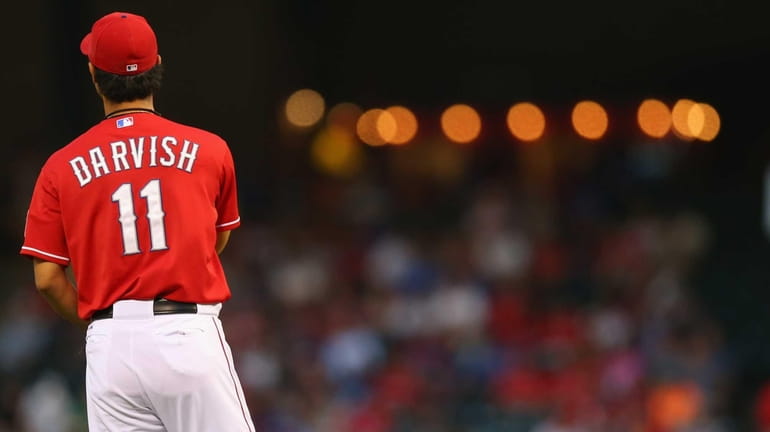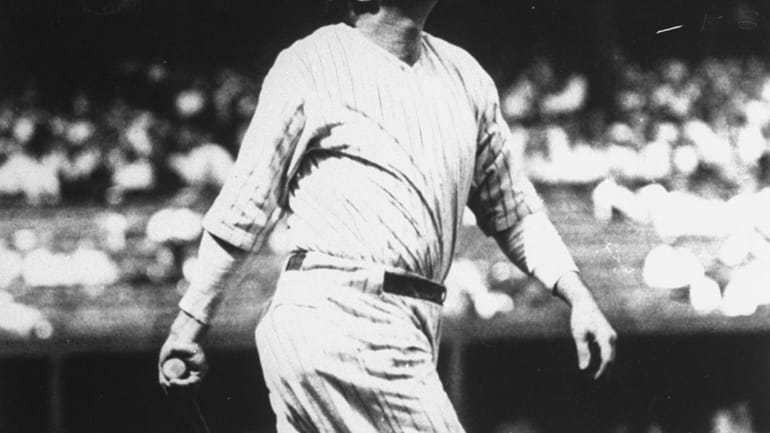Sources: Major changes coming to Japanese player posting system

Yu Darvish #11 of the Texas Rangers throws against the Pittsburgh Pirates in the first inning at Rangers Ballpark in Arlington. (Sept. 9, 2013) Credit: Getty Ronald Martinez
What if Ichiro Suzuki had been free to pick the Mets over the Mariners when he first came to the United States? What if Yu Darvish had been given permission to choose the Yankees rather than sign with the Rangers?
What then? How would those decisions have impacted Major League Baseball and its Japanese counterpart, Nippon Professional Baseball? And what about the players themselves? Would they have been better off?
It appears we are about to find out.
Multiple sources told Newsday that significant changes to the current posting system for Japanese players seem to be imminent and could take effect as soon as this November. That would enable the next coveted Japanese ace, Masahiro Tanaka of the Rakuten Golden Eagles, to benefit from an expanded -- and presumably more player-friendly -- process should he follow through on his reported desire to play in the United States next season.
The current system uses a bidding process to determine which U.S. team wins the rights to negotiate with -- and potentially sign -- a Japanese player. Since 1998, MLB teams have submitted sealed bids with only one winner emerging and having a window to negotiate a contract.
But according to sources, one of the proposals for a new system would have as many as three teams chosen among the top bidders, with the Japanese player then allowed to choose the club he'd prefer to play for and negotiate with.
Major League Baseball refused to comment on any details of potential changes to the current posting system or when they could be implemented. But Kim Ng, MLB's senior vice president for baseball operations, did acknowledge that the two sides have talked about the issues involving the posting process.
"We've been in discussions with NPB for some time now,'' Ng said, "and we continue to work through the different scenarios and resolutions.''
In the minds of many, the overhaul feels overdue. The posting agreement has been renewable on a year-to-year basis, with either side able to re-open conversations about it for the coming offseason. And with Tanaka the most prominent member of this year's potential posting class, it should be an interesting case study in how the new system works out.
One scout who recently saw Tanaka doesn't put him in the same class as Darvish, who in almost two full seasons with the Rangers -- a total of 57 starts -- is 28-17 with a 3.38 ERA and 467 strikeouts, an average of 11.1 per nine innings. In the posting era, Darvish is the king, warranting a record $57.7-million fee in 2011 from the Rangers, who then signed him to a six-year, $60-million contract.
Darvish surpassed Daisuke Matsuzaka's 2006 mark of $51.1 million, which shattered the previous high ($13.1 million) awarded to the Orix Blue Wave for Ichiro six years earlier.
In perhaps a knee-jerk reaction to the Red Sox getting Dice-K, the Yankees made the top posting bid of $26 million for Kei Igawa the same week, and Igawa's subsequent five-year, $20-million deal turned into one of the worst investments in Yankees history.
Even with the looming changes, Tanaka figures to cash in -- along with the Eagles, of course. On Friday, the 24-year-old righthander improved to 21-0 this season and won his 25th consecutive decision, edging past Carl Hubbell's major-league record that has stood in the States for 76 years. Tanaka has a 1.24 ERA -- a number made more impressive by the reported "juiced'' baseball being used in Japan this season -- and 155 strikeouts in 181 innings.
Under the current system, Tanaka must notify the club of his desire to go to the majors and the Eagles then would have to allow him to leave. In Japan, a player needs nine years of service time to become a free agent -- as opposed to six in the majors -- so the posting process remains his only option if he wants to go elsewhere.
But there's many conflicting interests at work here. For one, the NPB teams want some sort of protection so their star players don't simply bolt for the majors, keep draining the Japanese talent pool and weaken their league. At least with a posting fee, there is compensation for that, and a club that is struggling financially can receive a boost by a player's departure.
For the players, obviously, it feels like an unfair labor practice. The Yankees' Hiroki Kuroda waited those nine years before leaving the Hiroshima Carp to sign with the Dodgers in 2008, but he acknowledges the combative forces at work between the players and teams. He said the posting system is like Japanese teams "selling'' players to the majors, and if the proposed changes go through, it would enable a freer exchange between the two leagues.
"If it gets easier to do, more Japanese players will come here,'' Kuroda said through his interpreter.
In addition, by expanding the number of major-league teams available to pick from -- rather than awarding the sole rights to the highest bidder -- it prevents clubs that have no legitimate interest in a player from blocking others that want to sign him. Currently, a team can offer an overly inflated bid, then not make a sincere effort to sign the player, who then would just return to his Japanese team.
As one major-league official said, the goal for clubs is to win the bid by a dollar, not $10 million. But if the process does open up to more bidding teams, as expected, it could be an advantage to teams in locations that traditionally have been more attractive to Japanese players, such as New York, Boston and the West Coast clubs, from Los Angeles to Seattle.
The Yankees are among the teams that have scouted Tanaka, but estimating the parameters of a posting bid is an inexact science. Based on the market for Darvish, and factoring in inflation, the Eagles should get more than $50 million. But it's impossible to predict the outcome without first knowing the rules, and until the two leagues iron that out -- possibly very soon -- the future of Tanaka and the posting system is only a guessing game at this point.

